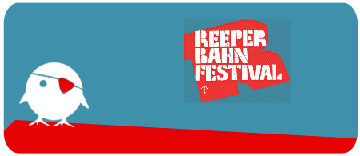
There is no reasoning with German bouncers. This is generally true, regardless of nationality, but a velvet rope is especially imposing when combined with a language barrier and a side of Hamburg beef. But, for the most anticipated show of 2009’s Reeperbahn Festival—on the legendarily debauched strip near the Hamburg waterfront—there wasn’t getting anywhere near the bouncers, anyway, even with a press pass, let alone inside the cavernous Haspa Bühne to see Deichkind, who—from what I can tell—are something like Hamburg’s biggest homegrown rap-metal post-GWAR superstars.
I can only assume that what I missed was the biggest mindblow of the three-night festival, which opened on September 24th. Guido, our guide, told us Deichkind are hard to photograph because they wrap themselves in plastic (or maybe tinfoil) and crowd-surf on giant inflatable rafts and throw things at people holding cameras. Awesome.
Outside, the entirely pedestrian Große Freiheit seethed with shut-out fans. Two teenaged boys looked aggressively heartbroken that they wouldn’t be seeing their post-GWAR rap-metal heroes that night, and—after asking to consult my festival schedule—shrugged off through the only marginally-less-seething crowds spilling from the block’s dozen strip clubs.
There was plenty of other music on the festival docket, mostly from a European indie rock culture entirely unknown in the United States. A few blocks away, in Prinzenbar, a turn-of-the-century cinema that felt like an ornate church eave, Mattias Hellberg and the White Moose—a Swedish jamband that sounded like an Allmans-influenced groove combo from Wetlands circa 1993—sang about getting funky. (The German boys were leaving as I arrived.) In Annie’s Nightclub, on the main drag, the French trio Revolver dealt in pleasant chamber pop. Only a small handful of American acts were to be found, the largest being the recently reunited Dinosaur Jr., who turned in a masterful set at the D-Club on the festival’s opening night, and Times New Viking, the noise-pop darlings from Columbus, Ohio, played a blistering set in the Kaiserkeller, one of the Beatles’ homebases. And this, according to festival organizers, is entirely by design. It is a European festival for European music, despite the fact that many—from Hellberg to Emiliana Torrini, who headlined the middle night—sing in English.
For that matter, though, now in its fourth year, the Reeperbahn Festival has had no problem selling tickets, taking an astonishing 17,000 through the virtual turnstiles for shows scattered between a dozen-and-a-half clubs, and taking over the neighborhood’s main boulevard with a pair of LED-bedecked stages that looked airlifted from a U2 gig, plus Flatstock (an exhibition of poster art), a “campus” featuring panels with titles like “Panel: Brands & Music: Is the best yet to come?,” and the usual array of festival vendors.
Stumbling between venues in a town where open street drinking is de rigueur, bracelets admitted attendees into nooks like the Hasenschaukel (where members of the Irish Grand Pocket Orchestra tucked into booths to play their instruments) and cavernous halls like Uebel & Gefährlich (where Orka, from the—!!!—Faroe Islands, unleashed massive post-Bjork downtempo sweeps), a dance floor inside a World War II-era anti-artillery fortress (read: Nazi bunker) next to the circus grounds and football field. The Reeperbahn Festival is something like South by Southwest held on Bourbon Street, with a dash of the old Times Square.
While Hamburg’s waterfront is a progressive, mixed-use quarter—a genuine shipping port mingles with a bar-and-restaurant-spangled promenade—the Reeperbahn remains of a single function: pleasure. It does this so efficiently that the corner of Davidstr and Spielbudenplatz sports both the nation’s busiest police station, as well as its busiest bank. (Indeed, the lines for the cash machine on Friday and Saturday nights extended down the block.) There are sex shops and strip clubs, of course. Prostitution remains legal. Like Amsterdam’s own red light district, the hookers hang out on a special block—men only, above 18—and sit in windows where Johanns might find them. But they hang elsewhere, too, aggressively grabbing those who might look in need of a shag or a lightening of Euros in their wallets. Mostly, though, thanks to the booze and sex, the place is filled with the German equivalent of drunk frat boys, bachelorette parties, and 24 hour partei people. There is still a block where genuine transvestites hang out. Not even New York has that anymore. (It is called, incidentally, Schmuckstraße. After the German word for “jeweler,” though, not the more appropriate Yiddish meaning, though the latter certainly evolved from the former.)


No Comments comments associated with this post